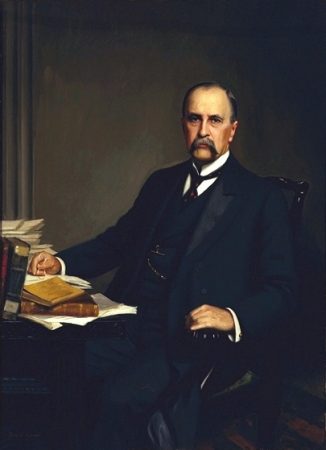
Sir William Osler (1849-1919) was a Canadian-American doctor, academic and medical pioneer. The son of a British naval officer and a pious Christian woman, Osler was born in Ontario and educated in Toronto, Montreal and London. In the 1880s be became chief of clinical medicine at the University of Pennsylvania and a founding member of the Association of American Physicians. Osler relocated to Baltimore and became a co-founder of Johns Hopkins Hospital and School of Medicine. He remained at Johns Hopkins for 12 years, overseeing its rapid growth and evolution into one of America’s foremost medical research facilities.
In 1905 Osler accepted the Regius Professorship at Oxford University. Just before embarking for England he delivered a controversial farewell address to the Johns Hopkins alumni, in which he suggested that the most important work was done by younger folk:
“The effective, moving, vitalising work of the world is done between the ages of 25 and 40, these 15 golden years of plenty, the anabolic or constructive period in which there is always a balance in the mental bank and the credit is still good.”
“It can be maintained that all the great advances have come from men under 40, so the history of the world shows that a very large proportion of the evils may be traced to the sexagenarians… Nearly all the great mistakes, politically and socially, all of the worst poems, most of the bad pictures, a majority of the bad novels, not a few of the bad sermons and speeches.”
Osler’s solution drew on the writings of Anthony Trollope. Men (and only men, as he considered elderly women a “good influence” on society) should be subject to compulsory Logan’s Run-style euthanasia, once they hit the age of 60:
“The uselessness of men above 60 years of age and the incalculable benefit it would be in commercial, political and professional life [if they were to] stop work at this age… the plot hinges on the admirable scheme of a college into which, at 60, men retired for a year of contemplation, before a peaceful departure by chloroform.”
The popular press seized on Osler’s proposal and hounded him for the best part of a year. Great presidents, philosophers and inventors in their 60s were held up as potential victims of Osler’s program. “Oslerization” and “Oslerizing” became synonyms for euthanasia. Some newspapers queried whether Osler, who was 56 at the time, would volunteer to be first in line for compulsory chloroforming.
Osler’s suggestion was tongue in cheek, of course, something he later pointed out – but his negativity about older people, their lack of productivity and resource-sapping uselessness was certainly well documented. Osler himself died in 1919, aged 70, from influenza and pneumonia. Ironically, he once described these diseases as “friendly” to old people because of their capacity for a relatively painless death.
Source: William Osler, “Ageing and the Fixed Period” (address), Baltimore, February 22nd 1905. Content on this page is © Alpha History 2019-23. Content may not be republished without our express permission. For more information please refer to our Terms of Use or contact Alpha History.
